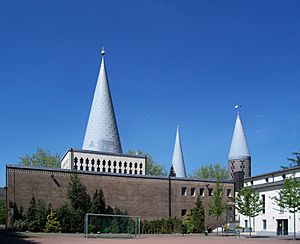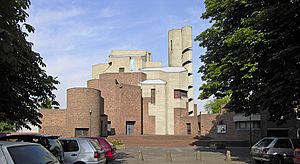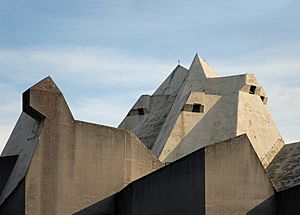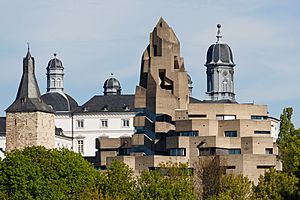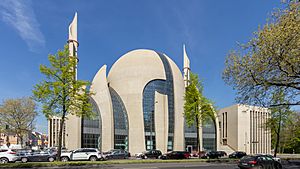Gottfried Böhm facts for kids
Quick facts for kids
Gottfried Böhm
|
|
|---|---|
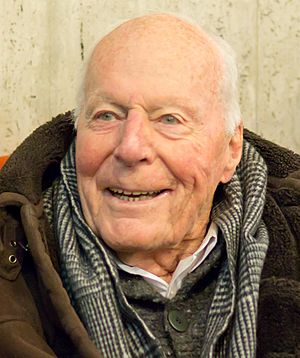
Gottfried Böhm in 2015
|
|
| Born | 23 January 1920 |
| Died | 9 June 2021 (aged 101) |
| Alma mater | Technische Hochschule, Munich |
| Occupation | Architect |
| Awards | Pritzker Prize |
| Buildings | Maria, Königin des Friedens in Neviges Bensberg City Hall |
Gottfried Böhm (born January 23, 1920 – died June 9, 2021) was a famous German architect and sculptor. He was known for designing unique, sculptural buildings. He often used materials like concrete, steel, and glass. One of his first important buildings was the "Madonna in the Rubble" chapel in Cologne, finished in 1949. It was built where an old church stood before it was destroyed during World War II. Böhm's most famous building is the Maria, Königin des Friedens pilgrimage church in Neviges.
In 1986, Gottfried Böhm became the first German architect to win the important Pritzker Prize. Some of his more recent projects include the Hans Otto Theater in Potsdam (finished in 2006) and the Cologne Central Mosque, which was completed in 2018.
Contents
Early Life and Education
Gottfried Böhm was born in Offenbach am Main, near Frankfurt, on January 23, 1920. He was the youngest of three children. His father, Dominikus Böhm, was also a well-known architect. His father designed many modern churches across Germany. Even his grandfather was an architect!
During World War II, Böhm joined the German army. He served until 1942 when he was injured. After returning to Germany, he studied at the Technical University of Munich. He graduated in 1946. After that, he also studied sculpture at an art academy. He later used his skills in making clay models to help him design buildings.
Architectural Career
After finishing his studies in 1947, Gottfried Böhm worked for his father. He continued working there until his father passed away in 1955. Then, Gottfried took over his father's architecture firm. During this time, he also helped with the "Society for the Reconstruction of Cologne."
In 1951, he traveled to New York City. He worked for six months at an architectural firm there. While in the United States, he met two architects who greatly inspired him: Ludwig Mies van der Rohe and Walter Gropius.
Over the next few decades, Böhm designed many buildings across Germany. These included museums, city halls, office buildings, homes, apartment buildings, and churches. He was known for connecting the past with the future in his designs. He also linked his buildings to their surroundings. Böhm always thought about how a building's color, shape, and materials would fit into its setting.
His earlier buildings were often made of molded concrete. Later, he started using more steel and glass. This was because these materials had improved technically. Böhm also cared a lot about urban planning, which is how cities are designed. He designed buildings not only in Germany but also in Los Angeles, Tokyo, and Turin, Italy.
In 2014, a documentary called "Concrete Love – The Böhm Family" was made. It explored Gottfried's relationships with his sons and his wife.
Family Life
Gottfried Böhm was married to Elizabeth Haggenmüller. She was also an architect. They met in 1948 while studying in Munich. Elizabeth helped Gottfried with many of his projects, especially with interior design.
They had four sons together: Stephan, Peter, Paul, and Markus. Three of their sons also became architects. Markus chose to be a painter. Gottfried Böhm lived a long life and turned 100 years old in January 2020.
Böhm passed away at his home in Cologne on June 9, 2021. He was 101 years old.
Notable Buildings
- 1947–50 St. Kolumba, Cologne
- 1962–69 Bensberg City Hall
- 1968–72 Maria, Königin des Friedens pilgrimage church, Neviges
- 1968–70 Christi Auferstehung (Church of Resurrection), Cologne
Awards and Recognition
Gottfried Böhm received many awards for his amazing work in architecture:
- 1968 – Eduard-von-der-Heydt Prize
- 1971 – Architecture Prize of the Association of German Architects
- 1974 – Berlin Art Prize
- 1975 – Big BDA award
- 1977 – Honorary Professor at F. Villareal National University, Peru
- 1982 – Grande Medaille d'Or d'Architecture from L'Académie d'Architecture in Paris
- 1983 – Honorary Member of the American Institute of Architects (AIA)
- 1985 – Fritz Schumacher Prize
- 1985 – Honorary doctorate from Technical University of Munich
- 1985/1986 – Price Cret Chair at the University of Pennsylvania
- 1986 – Pritzker Architecture Prize
- 1987 – Gebhard Fugel Prize
- 1993 – Rheinischer Kulturpreis
See also
 In Spanish: Gottfried Böhm para niños
In Spanish: Gottfried Böhm para niños
 | Anna J. Cooper |
 | Mary McLeod Bethune |
 | Lillie Mae Bradford |


